Countertop Materials: Which is the Most Heat-Resistant?
Posted on: February 28, 2022
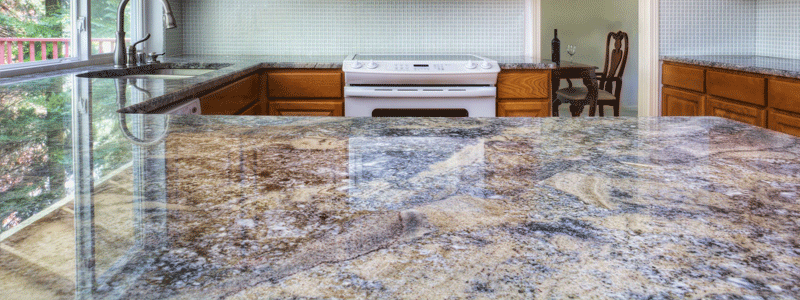
The need for durable kitchen countertop materials is essential, as they are often exposed to high temperatures from hot machines. The common question consumers have when choosing a new countertop is which material will be the most heat-resistant?
There are different types of countertops that vary in cost and durability. In this article, you will learn about the most popular material options and what to consider when purchasing your new countertops!
Granite Countertops:
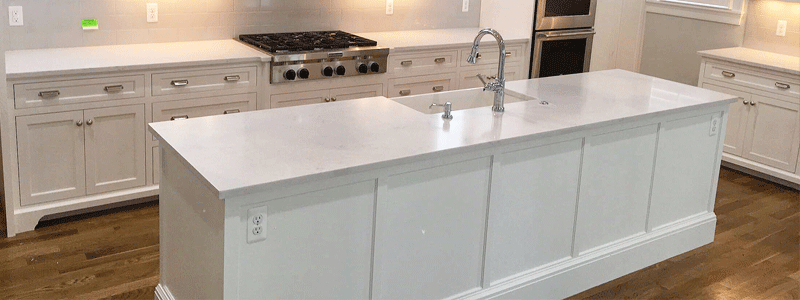
Granite is a very popular option as it has a unique color and pattern that allows consumers to customize the countertops. It has high heat resistance because of its composition from quartz, feldspar, and mica. When granite comes into direct contact with heat, it may cause thermal shock, which is when it cracks. For this reason, proper care should be taken to place hot pans and dishes on coasters or trivets (which can be purchased for less than $15) before placing them directly on the surface.
The Pros of Granite Countertops:
- Granite is extremely durable
The Cons of Granite Countertops:
- It may crack due to thermal shock when coming into contact with high heat.
Marble Countertops:
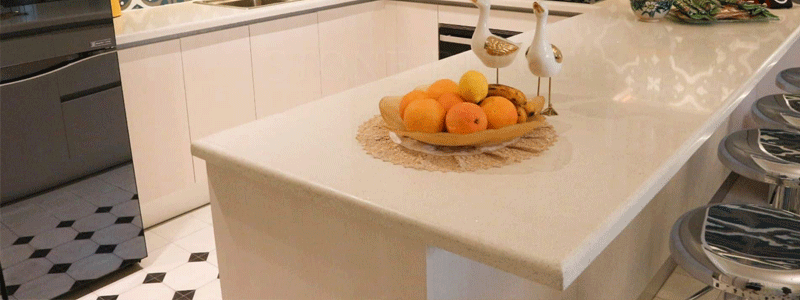
Marble also offers beautiful patterns and varied colors like granite, but marble tends to scratch more easily than other countertop materials such as granite. Marble counters are less prone to cracking because they are made of calcium carbonate. However, marble can easily be stained (spills or dirt) and require more polishing and maintenance than other materials.
The Pros of Marble Countertops:
- Aesthetically beautiful
- It does not crack like granite
The Cons of Marble Countertops:
- Cracks due to thermal shock when in contact with high heat ( but less likely than granite countertops )
- Easily stained and scratched
Quartz Countertops:
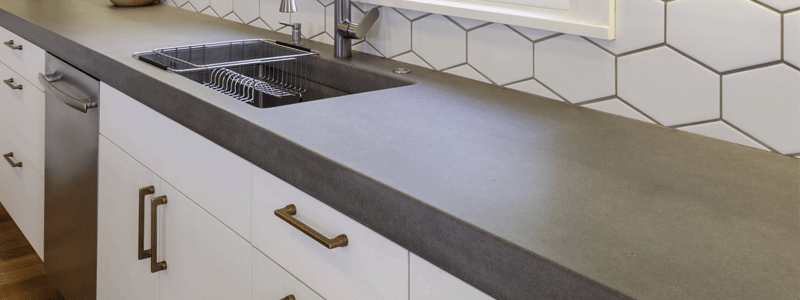
Quartz is a man-made composite material that is often used to create kitchen countertops due to its durability and ability to resist heat. When compared with granite, quartz has more consistent textures, patterns, and colors. While some natural stone materials are porous (e.g., marble), quartz does not absorb liquids like water or oils, making it easy to clean spills on your new countertops!
The Pros of Quartz Countertops:
- Hip; more contemporary design
- Heat resistant
- Nonporous; won't absorb liquids
The Cons of Quartz Countertops:
- Costly (can cost up to $50 per square foot)
Concrete Countertops:
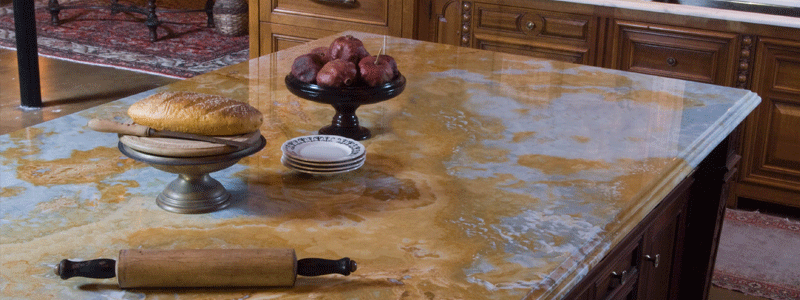
Concrete counters are very popular with homeowners because they are affordable, customizable, and durable. Unlike real stone materials, concrete can be sculpted into different colors, patterns, and designs to suit your specific tastes. Concrete resists stains well but is not resistant to heat or temperature changes.
The Pros of Concrete Countertops:
- Affordable
- Customizable; you can create any color and pattern
The Cons of Concrete Countertops:
- Does not resist stains well (but does better than granite countertops)
- Not heat resistant (you cannot place hot pans directly on the surface like other materials )
Natural Stone Surfaces:
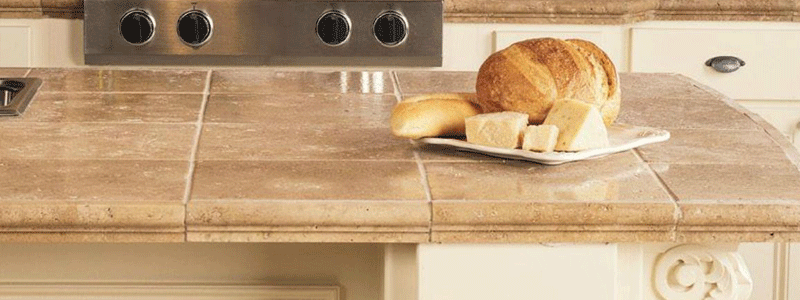
Natural stones such as marble, soapstone, limestone, etc., are also commonly used for kitchen countertops. These can be costly, but they offer a unique color and design that cannot be achieved with other materials like quartz, concrete, or granite. The only downside to natural stone is it is porous, which means dirt and liquids may get trapped in the stone, causing discoloration over time.
The Pros of Natural Stone Surfaces:
- Unique pattern, color, and feel
The Cons of Natural Stone Surfaces:
- Porous so dirt and stains may become trapped in the surface (soapstone does better than other types)
Tile Countertops
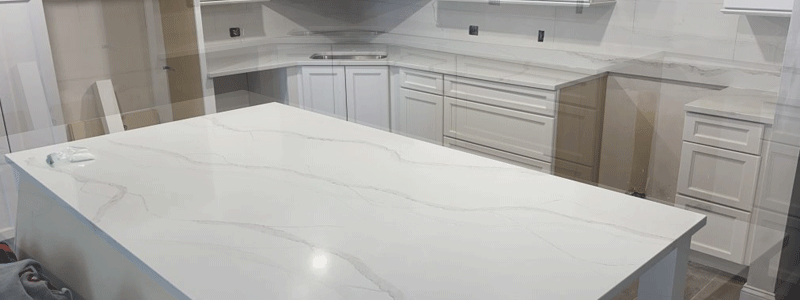
Natural stones such as marble, soapstone, limestone, etc., are also commonly used for kitchen countertops. These can be costly, but they offer a unique color and design that cannot be achieved with other materials like quartz, concrete, or granite. The only downside to natural stone is it is porous, which means dirt and liquids may get trapped in the stone, causing discoloration over time.
The Pros of Tile Countertops:
- Customizable; any color, shape, size, feel you desire
- Mixing and matching tiles is easy!
The Cons of Tile Countertops:
- Not heat resistant (you cannot place hot pans directly on the surface like other materials )
- Prone to stains
Quartz vs. Granite: The Battle of the Kitchen Counters
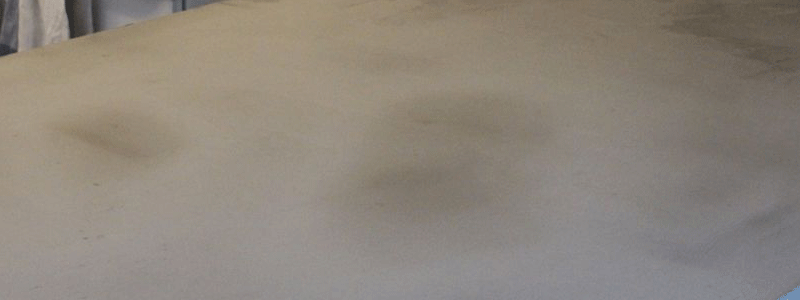
So what's better? Quartz countertops or granite countertops? Both offer a lot of benefits and pros, and the decision will largely depend on personal preferences. Although granite countertops are more likely to crack due to thermal shock when in contact with high heat, they may last longer than quartz because it is made for durability. However, by choosing a quartz countertop, you can avoid any issues with cracking as well as stains (although they might be easier to scratch), and they also do not conduct heat like other materials!
Consider Your Entire Kitchen Design:
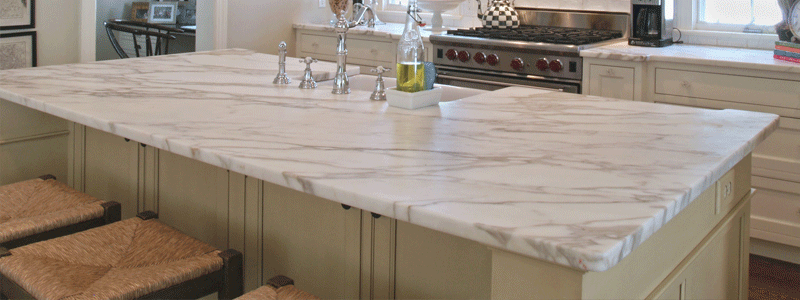
The best way to make sure you buy the right material for your kitchen is by considering it as a whole rather than focusing solely on the countertops! This means taking into account all of your cabinets, flooring, appliances, tiles, etc., and finding what works best. For example, if you're looking to create a modernized design, then maybe quartz or concrete is better suited for you, while if you prefer something natural, then perhaps stone would be better.
When choosing materials, always consider your entire kitchen and how the different materials will complement each other. Make sure to review all of the pros and cons of every material you are considering so you can pick out what works best for you! Also, remember that material choice should be affected by overall design and style preference.
Regardless of which material you choose, every kitchen will benefit from using a tile backsplash because it is easy to clean and helps protect your walls from stains and water damage.
Final Thoughts
When it comes to choosing the best material for your kitchen countertops, there are many factors you should take into consideration before buying. However, when in doubt, remember that every kitchen benefits from the addition of a tile backsplash! By considering the pros and cons of all possible options, you can see which material suits you best.











